万圣节和中元节 -英文版样本
英语广播稿小学

英语广播稿小学【篇一:小学英语广播稿】英语广播稿五年级(一)五年级一班a: good morning, boys and girls! welcome to our happy english! b: 亲爱的老师们同学们,大家早上好!我们英语之声又和大家见面了!a: my name is yang xu, i’m from class 1 grade 5我叫杨旭,我来自五年级一班。
b: my name is feng siqi, i’m from class 1 grade 5我叫冯思琪,我来自五年级一班。
a: feng siqi, do you know today is a special day?冯思琪,你知道今天是个什么特别的日子吗?b: sorry, can you tell me?对不起,你可以告诉我吗?a: today is teacher’s day。
今天是教师节。
b: oh, teacher’s day, i got it.哦,教师节呀,我明白了。
那教师节快乐怎么说呢?a: happy teacher’s day!教师节快乐!b: happy teacher’s day!教师节快乐!b: 同学们,今天一定要给我们亲爱的老师道一声:“教师节快乐” happy teacher’s day!ab: 同学们,你们学会了吗?和我们再说一遍,happy teacher’s day! a: now, let’s go to our second part “english show”.现在让我们进入今天第二个板块“英语秀”。
b: 同学们,人体各部分的英语名称很多,如果你记不住,也没关系,多做练习一定能记得住。
ab: 同学们,起得早,大家快来做做操。
a: mouth mouth b: 是嘴巴a: nose nose b: 是鼻子a: face face b: 是脸颊a: neck neck b: 是脖子a: arms arms b: 是胳膊a: hands hands b: 是小手ab: 同学们,我们一起做做操吧。
有关中元节的详细英文介绍

有关中元节的详细英文介绍中元节英语介绍Just as Halloween is for Americans, the “Hungry Ghost Festival” is for Chinese. Ghost Festival is one of Chinese traditional occasions, which is taken very seriously by the Chinese. This festival usually falls on the15th day of the 7th month of the lunar calendar. The Ghost Festival, some places say the Hungry Ghost Festival, is also called Half July (Lunar), Ullambana, which is closely related to Buddhism, and zhongyuan jie which is the Taoism saying and Folk Belief.就像万圣节对于美国人一样,中国也有鬼节。
鬼节是中国传统节日之一,并且被中国人认真看待。
这个节日通常是阴历七月十五。
鬼节(有些地方翻译为饿鬼节),又叫七月半,佛教称之为盂兰盆节,中元节是道教的称法,同时也是一种民间说法。
It is believed by the Chinese that the dead become ghosts roaming between Heaven and Earth unless they have descendants to care for them during the Ghost Festival. During this month, the gates of hell are thrown open to free the hungry ghosts who then wander to seek food on Earth. Some even think that the ghosts would seek revenge on those whohad wronged them in their lives. However, more people remember their ancestors on this day. The Ghost Festival becomes a time for remembering the importance of filial piety. The reason why the Chinese celebrate this festival is to remember their dead family members and pay tribute to them. They also feel that offering food to the deceased appeases them and wards off bad luck. People now release river lights as an important activity during this time, since it is said that river light can comfort and warm the homeless ghosts. In some areas, visitors may also see small roadside fires, where believes burn paper money and other offerings to appease the restless spirits who have temporarily been released from Hades.中国人认为除非一个人有子孙后代能够在他死后在鬼节这天悼念他们,否则人死后会变成鬼魂在天地之间游荡。
中国的节日用英语表达
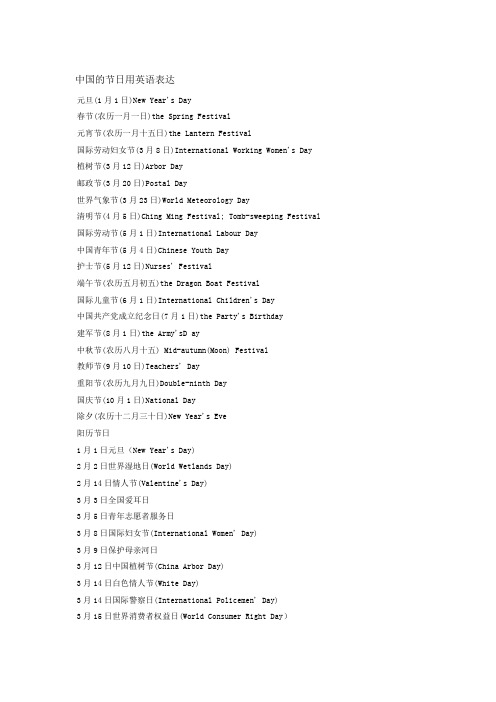
中国的节日用英语表达元旦(1月1日)New Year's Day春节(农历一月一日)the Spring Festival元宵节(农历一月十五日)the Lantern Festival国际劳动妇女节(3月8日)International Working Women's Day 植树节(3月12日)Arbor Day邮政节(3月20日)Postal Day世界气象节(3月23日)World Meteorology Day清明节(4月5日)Ching Ming Festival; Tomb-sweeping Festival 国际劳动节(5月1日)International Labour Day中国青年节(5月4日)Chinese Youth Day护士节(5月12日)Nurses' Festival端午节(农历五月初五)the Dragon Boat Festival国际儿童节(6月1日)International Children's Day中国共产党成立纪念日(7月1日)the Party's Birthday建军节(8月1日)the Army'sD ay中秋节(农历八月十五) Mid-autumn(Moon) Festival教师节(9月10日)Teachers' Day重阳节(农历九月九日)Double-ninth Day国庆节(10月1日)National Day除夕(农历十二月三十日)New Year's Eve阳历节日1月1日元旦(New Year's Day)2月2日世界湿地日(World Wetlands Day)2月14日情人节(Valentine's Day)3月3日全国爱耳日3月5日青年志愿者服务日3月8日国际妇女节(International Women' Day)3月9日保护母亲河日3月12日中国植树节(China Arbor Day)3月14日白色情人节(White Day)3月14日国际警察日(International Policemen' Day)3月15日世界消费者权益日(World Consumer Right Day)3月21日世界森林日(World Forest Day)3月21日世界睡眠日(World Sleep Day)3月22日世界水日(World Water Day)3月23日世界气象日(World Meteorological Day)3月24日世界防治结核病日(World Tuberculosis Day)4月1日愚人节(April Fools' Day)4月5日清明节(Tomb-sweeping Day)4月7日世界卫生日(World Health Day)4月22日世界地球日(World Earth Day)4月26日世界知识产权日(World Intellectual Property Day)5月1日国际劳动节(International Labour Day)5月3日世界哮喘日(World Asthma Day)5月4日中国青年节(Chinese Youth Day)5月8日世界红十字日(World Red-Cross Day)5月12日国际护士节(International Nurse Day)5月15日国际家庭日(International Family Day)5月17日世界电信日(World Telecommunications Day)5月20日全国学生营养日5月23日国际牛奶日(International Milk Day)5月31日世界无烟日(World No-Smoking Day)6月1日国际儿童节(International Children's Day)6月5日世界环境日(International Environment Day)6月6日全国爱眼日6月17日世界防治荒漠化和干旱日(World Day to combat desertification)6月23日国际奥林匹克日(International Olympic Day)6月25日全国土地日6月26日国际禁毒日(International Day Against Drug Abuse and Illicit Trafficking) 7月1日中国共产党诞生日(Anniversary of the Founding of the Chinese Communist Party)7月1日国际建筑日(International Architecture Day)7月7日中国人民抗日战争纪念日7月11日世界人口日(World Population Day)8月1日中国人民解放军建军节(Army Day)8月12日国际青年节(International Youth Day)9月8日国际扫盲日(International Anti-illiteracy Day)9月10日中国教师节(Teacher's Day)9月16日中国脑健康日9月16日国际臭氧层保护日(International Day for the Preservation of the Ozone Layer)9月20日全国爱牙日9月21日世界停火日(World Cease-fire Day)9月27日世界旅游日(World Tourism Day)10月1日中华人民共和国国庆节(National Day)10月1日国际音乐日(International Music Day)10月1日国际老年人日(International Day of Older Persons)10月4日世界动物日(World Animal Day)10月5日世界教师日(World Teachers' Day)(联合国教科文组织确立)10月8日全国高血压日10月9日世界邮政日(World Post Day)10月10日世界精神卫生日(World Mental Health Day)10月14日世界标准日(World Standards Day)10月15日国际盲人节(International Day of the Blind)10月15日世界农村妇女日(World Rural Women's Day)10月16日世界粮食日(World Food Day)10月17日国际消除贫困日(International Day for the Eradication of Poverty)10月24日联合国日(United Nations Day)10月24日世界发展新闻日(World Development Information Day)10月28日中国男性健康日10月29日国际生物多样性日(International Biodiversity Day)10月31日万圣节(Halloween)11月8日中国记者节11月9日消防宣传日11月14日世界糖尿病日(World Diabetes Day)11月17日国际大学生节11月25日国际消除对妇女的暴力日(International Day For the elimination of Violence against Women)12月1日世界爱滋病日(World AIDS Day)12月3日世界残疾人日(World Disabled Day)12月4日全国法制宣传日12月9日世界足球日(World Football Day)12月25日圣诞节(Christmas Day)12月29日国际生物多样性日(International Biological Diversity Day)1月最后一个星期日国际麻风节3月最后一个完整周的星期一中小学生安全教育日春分月圆后的第一个星期日复活节(Easter Monday)(有可能是3月22-4月25日间的任一天) 5月第二个星期日母亲节(Mother's Day)5月第三个星期日全国助残日6月第三个星期日父亲节(Father's Day)9月第三个星期二国际和平日(International Peace Day)9月第三个星期六全国国防教育日9月第四个星期日国际聋人节(International Day of the Deaf)10月的第一个星期一世界住房日(World Habitat Day)10月的第二个星斯一加拿大感恩节(Thanksgiving Day)10月第二个星期三国际减轻自然灾害日(International Day for Natural Disaster Reduction) 10月第二个星期四世界爱眼日(World Sight Day)11月最后一个星期四美国感恩节(Thanksgiving Day)农历节日农历正月初一春节(the Spring Festival)农历正月十五元宵节(Lantern Festival)农历五月初五端午节(the Dragon-Boat Festival)农历七月初七乞巧节(中国情人节)(Double-Seventh Day)农历八月十五中秋节(the Mid-Autumn Festival)农历九月初九重阳节(the Double Ninth Festival)农历腊月初八腊八节(the laba Rice Porridge Festival)农历腊月二十四传统扫房日春节俗称“过年”。
一年四季节日表
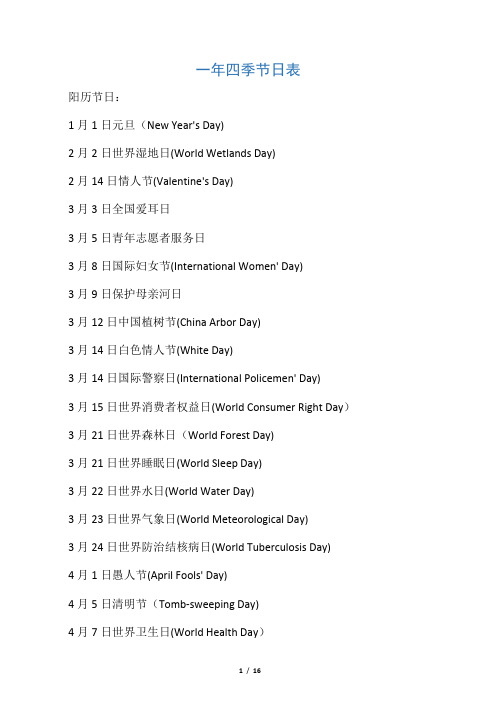
一年四季节日表阳历节日:1月1日元旦(New Year's Day)2月2日世界湿地日(World Wetlands Day)2月14日情人节(Valentine's Day)3月3日全国爱耳日3月5日青年志愿者服务日3月8日国际妇女节(International Women' Day)3月9日保护母亲河日3月12日中国植树节(China Arbor Day)3月14日白色情人节(White Day)3月14日国际警察日(International Policemen' Day)3月15日世界消费者权益日(World Consumer Right Day)3月21日世界森林日(World Forest Day)3月21日世界睡眠日(World Sleep Day)3月22日世界水日(World Water Day)3月23日世界气象日(World Meteorological Day)3月24日世界防治结核病日(World Tuberculosis Day)4月1日愚人节(April Fools' Day)4月5日清明节(Tomb-sweeping Day)4月7日世界卫生日(World Health Day)4月22日世界地球日(World Earth Day)4月26日世界知识产权日(World Intellectual Property Day)5月1日国际劳动节(International Labour Day)5月3日世界哮喘日(World Asthma Day)5月4日中国青年节(Chinese Youth Day)5月8日世界红十字日(World Red-Cross Day)5月12日国际护士节(International Nurse Day)5月15日国际家庭日(International Family Day)5月17日世界电信日(World Telecommunications Day)5月20日全国学生营养日5月23日国际牛奶日(International Milk Day)5月31日世界无烟日(World No-Smoking Day)6月1日国际儿童节(International Children's Day)6月5日世界环境日(International Environment Day)6月6日全国爱眼日6月17日世界防治荒漠化和干旱日(World Day to combat desertification)6月23日国际奥林匹克日(International Olympic Day)6月25日全国土地日6月26日国际禁毒日(International Day Against Drug Abuse and IllicitTrafficking)7月1日中国共产党诞生日(Anniversary of the Founding of the ChineseCommunist Party)7月1日国际建筑日(International Architecture Day)7月7日中国人民抗日战争纪念日7月11日世界人口日(World Population Day)8月1日中国人民解放军建军节(Army Day)8月12日国际青年节(International Youth Day)9月8日国际扫盲日(International Anti-illiteracy Day)9月10日中国教师节(Teacher's Day)9月16日中国脑健康日9月16日国际臭氧层保护日(International Day for the Preservation of theOzone Layer)9月20日全国爱牙日9月21日世界停火日(World Cease-fire Day)9月27日世界旅游日(World Tourism Day)10月1日中华人民共和国国庆节(National Day)10月1日国际音乐日(International Music Day)10月1日国际老年人日(International Day of Older Persons)10月4日世界动物日(World Animal Day)10月5日世界教师日(World Teachers' Day)(联合国教科文组织确立)10月8日全国高血压日10月9日世界邮政日(World Post Day)10月10日世界精神卫生日(World Mental Health Day)10月14日世界标准日(World Standards Day)10月15日国际盲人节(International Day of the Blind)10月15日世界农村妇女日(World Rural Women's Day)10月16日世界粮食日(World Food Day)10月17日国际消除贫困日(InternationalDayfortheEradicationofPoverty)10月24日联合国日(United Nations Day)10月24日世界发展新闻日(World Development Information Day)10月28日中国男性健康日10月29日国际生物多样性日(International Biodiversity Day)10月31日万圣节(Halloween)11月8日中国记者节11月9日消防宣传日11月14日世界糖尿病日(World Diabetes Day)11月17日国际大学生节11月25日国际消除对妇女的暴力日(International Day For the eliminationof Violence against Women)12月1日世界爱滋病日(World AIDS Day)12月3日世界残疾人日(World Disabled Day)12月4日全国法制宣传日12月9日世界足球日(World Football Day)12月25日圣诞节(Christmas Day)12月29日国际生物多样性日(International Biological Diversity Day)1月最后一个星期日国际麻风节3月最后一个完整周的星期一中小学生安全教育日春分月圆后的第一个星期日复活节(Easter Monday)(有可能是3月22-4月25日间的任一天)5月第二个星期日母亲节(Mother's Day)5月第三个星期日全国助残日6月第三个星期日父亲节(Father's Day)9月第三个星期二国际和平日(International Peace Day)9月第三个星期六全国国防教育日9月第四个星期日国际聋人节(International Day of the Deaf)10月的第一个星期一世界住房日(World Habitat Day)10月的第二个星斯一加拿大感恩节(Thanksgiving Day)10月第二个星期三国际减轻自然灾害日(International Day for NaturalDisaster Reduction)10月第二个星期四世界爱眼日(World Sight Day)11月最后一个星期四美国感恩节(Thanksgiving Day)中国传统节日·春节12/11·元宵节12/11·清明节12/11·端午节12/11·七夕节12/11·中秋节12/11·重阳节12/11·中元节12/11·冬至节12/11·妇女节12/11·劳动节12/11·青年节12/11·母亲节12/11·儿童节12/11·父亲节12/11·建军节12/11·教师节12/11·国庆节12/11·腊八节12/11·小年12/11·火把节12/11·寒食节12/11·奇异元旦风俗12/11 ·意大利人过元旦12/11 ·澳大利亚人过元旦12/11·腊八节与佛教的传说12/11·腊八节与朱元璋的传说12/11 ·腊八节与腊祭的传说12/11·腊八枣树“吃”米饭12/11·腊八节与腊八的传说12/11·腊八粥各地食俗12/11·冬至节的由来与传说12/11·冬至节的风俗12/11·与冬至有关的诗词12/11·小年的简介12/11·“小年祭灶”的民间传说12/11 ·小年的习俗及美食12/11·[春节溯源]"年"兽的传说12/11 ·小年后的春节前准备工作12/11 ·[春节溯源]熬年的传说12/11 ·[春节溯源]万年创建历法说12/11 ·[春节习俗]贴春联12/11·[春节习俗]贴门神12/11·[春节习俗]倒贴福字的传说12/11 ·[春节习俗]扫尘12/11·[春节习俗]除夕12/11·[春节习俗]年夜饭(团年饭)12/11·[春节习俗]守岁12/11·[春节习俗]迎春12/11·[春节习俗]红包(压岁钱)12/11·[春节习俗]新年赠橘12/11·[春节习俗]香港年俗12/11·[春节习俗]澳门年俗12/11·[春节习俗]新年放爆竹12/11·[春节习俗]拜年12/11·[春节习俗]接财神12/11·[春节习俗]回娘家12/11·[春节习俗]正月初六"送穷"12/11·[春节习俗]香港年俗12/11·[春节习俗]澳门年俗12/11·[春节习俗]台湾年俗12/11·[春节习俗]新加坡华人年俗12/11·[春节习俗]少数民族年俗12/11·[春节食俗]春节食俗12/11·[十二生肖]十二生肖的来源12/11·[十二生肖]何以十二生肖中无猫呢?12/11 ·[十二生肖]大笨牛行大运12/11·[十二生肖]十二生肖何以鼠为先12/11 ·[十二生肖]猛虎上当记12/11·[十二生肖]飞毛腿白兔12/11·[十二生肖]忠狗送信记12/11·[十二生肖]懒猪大逃亡12/11·[十二生肖]为何猴子屁股红12/11 ·[十二生肖]神奇魔术龙12/11·[十二生肖]大自然的闹钟12/11 ·[十二生肖]聪明的蛇医生12/11 ·[十二生肖]骏逸的千里马12/11 ·[十二生肖]脾气乖巧的羊12/11 ·[春联年画]年画12/11·[春联年画]年画琐谈12/11·[元宵游艺]耍狮子12/11·[元宵游艺]舞龙灯12/11·植树节拾趣12/11·各国植树节的日期12/11·藏族节日112/11·蒙古“那达慕大会”12/11·藏族节日212/11·壮族“歌婆节”12/11·傣族“泼水节”12/11·"火把节"12/11·回族“开斋节”12/11·阿昌族“会街节”12/11·瑶族“盘王节”12/11·僳僳族“刀杆节”12/11·白族“三月街”12/11·彝族“插花节”12/11·回族“古尔邦”12/11·纳西族“当美空普”12/11·壮族“花朝节”12/11·帑族“鲜花节”12/11·侗族“斗牛节”12/11·鄂温克族“敖包会”12/11·藏族“晒佛节”12/11·哈尼族“街心酒”12/11·土族的主要传统节日112/11 ·土族的主要传统节日212/11 ·广西苗族的古龙坡会12/11 ·穆斯林的古尔邦节12/11 ·踩山节12/11·“干巴”节12/11·土家族调年会12/11·回族的开斋节12/11·哈尼族的十月年12/11·水族端节12/11·黔东南州主要民族民间节日12/11 ·花样“十五”:“竖”中秋盼“月破”12/11·土族纳顿12/11·中秋节的兔爷儿12/11·吃新节12/11·火把节:不是狂欢节的狂欢节12/11 ·苗族赶歌会12/11·鄂温克族“米阔鲁”节12/11·三月街12/11·纳吾鲁孜节12/11·哈尼族“里玛主”节12/11·土家族的“三过年”12/11·白族“青姑娘节”12/11·景颇族“木脑”会的传说12/11·锡伯族抹黑节的传说12/11·景颇族目脑纵歌12/11·苗族过苗年12/11·彝族年12/11·楚地节日巫术形态12/11·寒衣节12/11·古老纳顿狂欢节12/11·少数民族中秋习俗拾趣12/11·天时与人时——民众时间意识探源12/11 ·难忘布朗山康节12/11·哈尼族苦扎扎节12/11·哈尼族苗爱拿节12/11·甘南舟曲藏族的朝水节12/11·苗族龙船节12/11·侗族大雾梁歌会12/11·壮族娅拜节12/11·苗家三月情12/11·织女传说与中国情人节考释(上)12/11 ·中国传统历书12/11·春播节12/11·藏北牧区新年习俗12/11·北方人过大年12/11·小年祭灶12/11·二十四节气12/11·姊妹节12/11·彝族年12/11·苗年12/11·团圆饼与月亮节12/11 ·雪顿节上的展佛仪式12/11 ·白族石宝山歌会12/11 ·雪顿节12/11·老人节12/11·花儿会12/11·雨节12/11·关帝诞12/11·药王诞辰12/11·四月八12/11·锡伯族的西迁节12/11 ·谷雨12/11·天后诞辰12/11·三月三12/11·三月街12/11·刀竿节12/11·春分12/11·惊蛰12/11·填仓节12/11·少数民族年-希恩吉乐12/11 ·藏历年12/11·赫哲年12/11·扩塔节12/11·嫩西节12/11·由奔吉锃12/11·崩南尼12/11·阿聂节12/11·打铁节12/11·人日12/11·布依族的过大年12/11 ·普米族的大过年12/11 ·普米族的大过年12/11 ·黎族的年月12/11·白年12/11·彝族老年节12/11·侗年12/11·太阳会12/11·蚂拐节12/11·二月二龙抬头12/11·重阳诗篇12/11·重阳节的习俗12/11·重阳节的起源12/11·重阳节简介12/11·中秋节诗词选12/11·各地中秋节的习俗12/11 ·中秋节的由来与传说12/11 ·中秋节简介12/11·元宵节诗词选12/11·元宵节习俗12/11·元宵节的由来与传说12/11 ·元宵节简介12/11·清明诗句12/11·清明节习俗12/11·清明节的由来与传说12/11 ·清明节简介12/11·七夕节的诗词12/11·乞巧七夕的习俗12/11·七夕的由来与传说12/11 ·七夕节的简介12/11·端午节诗选12/11·端午节的习俗12/11·端午节由来与传说12/11 ·端午节简介12/11·与冬至有关的诗词12/11 ·冬至节的风俗12/11·冬至节的由来与传说12/11 ·冬至节简介12/11·春节的诗歌12/11·春节的习俗12/11·春节的由来与传说12/11 ·春节简介12/11。
小学英语广场广播稿
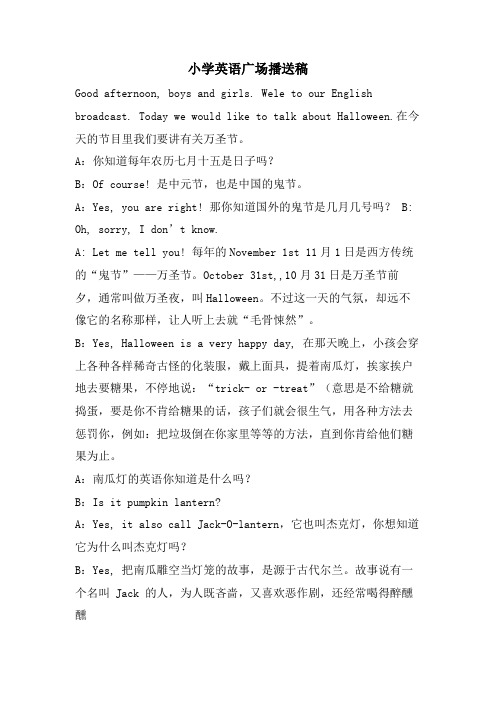
小学英语广场播送稿Good afternoon, boys and girls. Wele to our English broadcast. Today we would like to talk about Halloween.在今天的节目里我们要讲有关万圣节。
A:你知道每年农历七月十五是日子吗?B:Of course! 是中元节,也是中国的鬼节。
A:Yes, you are right! 那你知道国外的鬼节是几月几号吗? B: Oh, sorry, I don’t know.A: Let me tell you! 每年的November 1st 11月1日是西方传统的“鬼节”——万圣节。
October 31st,,10月31日是万圣节前夕,通常叫做万圣夜,叫Halloween。
不过这一天的气氛,却远不像它的名称那样,让人听上去就“毛骨悚然”。
B:Yes, Halloween is a very happy day, 在那天晚上,小孩会穿上各种各样稀奇古怪的化装服,戴上面具,提着南瓜灯,挨家挨户地去要糖果,不停地说:“trick- or -treat”(意思是不给糖就捣蛋,要是你不肯给糖果的话,孩子们就会很生气,用各种方法去惩罚你,例如:把垃圾倒在你家里等等的方法,直到你肯给他们糖果为止。
A:南瓜灯的英语你知道是什么吗?B:Is it pumpkin lantern?A:Yes, it also call Jack-O-lantern,它也叫杰克灯,你想知道它为什么叫杰克灯吗?B:Yes, 把南瓜雕空当灯笼的故事,是源于古代尔兰。
故事说有一个名叫 Jack 的人,为人既吝啬,又喜欢恶作剧,还经常喝得醉醺醺的。
一天 Jack喝醉了,碰见了一个恶魔,他把恶魔骗到了树上,随即在树桩上刻了个十字,让恶魔无法从树桩上下来,并恐吓恶魔容许他提出的条件,一番讨价还价之后,恶魔和JACK达成了协议,恶魔容许施法让JACK无论做什么,法律都无法制裁他。
万圣节手抄报内容
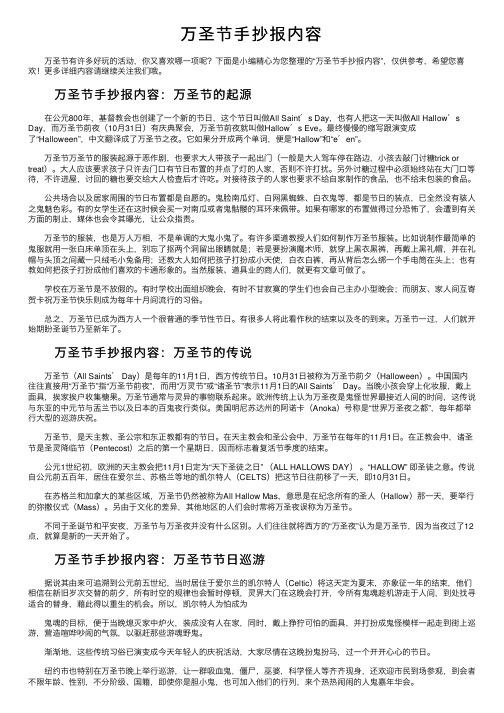
万圣节⼿抄报内容 万圣节有许多好玩的活动,你⼜喜欢哪⼀项呢?下⾯是⼩编精⼼为您整理的“万圣节⼿抄报内容”,仅供参考,希望您喜欢!更多详细内容请继续关注我们哦。
万圣节⼿抄报内容:万圣节的起源 在公元800年,基督教会也创建了⼀个新的节⽇,这个节⽇叫做All Saint's Day,也有⼈把这⼀天叫做All Hallow's Day,⽽万圣节前夜(10⽉31⽇)有庆典聚会,万圣节前夜就叫做Hallow's Eve。
最终慢慢的缩写跟演变成了“Halloween”,中⽂翻译成了万圣节之夜。
它如果分开成两个单词,便是“Hallow”和“e'en”。
万圣节万圣节的服装起源于恶作剧,也要求⼤⼈带孩⼦⼀起出门(⼀般是⼤⼈驾车停在路边,⼩孩去敲门讨糖trick or treat)。
⼤⼈应该要求孩⼦只许去门⼝有节⽇布置的并点了灯的⼈家,否则不许打扰。
另外讨糖过程中必须始终站在⼤门⼝等待,不许进屋,讨回的糖也要交给⼤⼈检查后才许吃。
对接待孩⼦的⼈家也要求不给⾃家制作的⾷品,也不给未包装的⾷品。
公共场合以及居家周围的节⽇布置都是⾃愿的。
⿁脸南⽠灯、⽩⽹⿊蜘蛛、⽩⾐⿁等,都是节⽇的装点,已全然没有骇⼈之⿁魅⾊彩。
有的⼥学⽣还在这时候会买⼀对南⽠或者⿁骷髅的⽿环来佩带。
如果有哪家的布置做得过分恐怖了,会遭到有关⽅⾯的制⽌,媒体也会令其曝光,让公众指责。
万圣节的服装,也是万⼈万相,不是单调的⼤⿁⼩⿁了。
有许多渠道教授⼈们如何制作万圣节服装。
⽐如说制作最简单的⿁服就⽤⼀张⽩床单顶在头上,别忘了抠两个洞留出眼睛就是;若是要扮演魔术师,就穿上⿊⾐⿊裤,再戴上⿊礼帽,并在礼帽与头顶之间藏⼀只绒⽑⼩兔备⽤;还教⼤⼈如何把孩⼦打扮成⼩天使,⽩⾐⽩裤,再从背后怎么绑⼀个⼿电筒在头上;也有教如何把孩⼦打扮成他们喜欢的卡通形象的。
当然服装、道具业的商⼈们,就更有⽂章可做了。
学校在万圣节是不放假的。
有时学校出⾯组织晚会,有时不⽢寂寞的学⽣们也会⾃⼰主办⼩型晚会;⽽朋友、家⼈间互寄贺卡祝万圣节快乐则成为每年⼗⽉间流⾏的习俗。
世界各国节日一览表
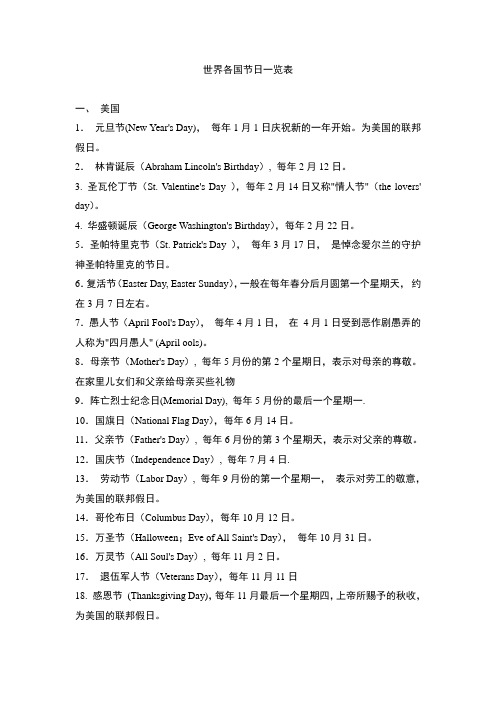
世界各国节日一览表一、美国1.元旦节(New Year's Day),每年1月1日庆祝新的一年开始。
为美国的联邦假日。
2.林肯诞辰(Abraham Lincoln's Birthday), 每年2月12日。
3. 圣瓦伦丁节(St. Valentine's Day ),每年2月14日又称"情人节"(the lovers' day)。
4. 华盛顿诞辰(George Washington's Birthday),每年2月22日。
5.圣帕特里克节(St. Patrick's Day ),每年3月17日,是悼念爱尔兰的守护神圣帕特里克的节日。
6.复活节(Easter Day, Easter Sunday),一般在每年春分后月圆第一个星期天,约在3月7日左右。
7.愚人节(April Fool's Day),每年4月1日,在4月1日受到恶作剧愚弄的人称为"四月愚人" (April ools)。
8.母亲节(Mother's Day), 每年5月份的第2个星期日,表示对母亲的尊敬。
在家里儿女们和父亲给母亲买些礼物9.阵亡烈士纪念日(Memorial Day), 每年5月份的最后一个星期一.10.国旗日(National Flag Day),每年6月14日。
11.父亲节(Father's Day), 每年6月份的第3个星期天,表示对父亲的尊敬。
12.国庆节(Independence Day), 每年7月4日.13.劳动节(Labor Day), 每年9月份的第一个星期一,表示对劳工的敬意,为美国的联邦假日。
14.哥伦布日(Columbus Day),每年10月12日。
15.万圣节(Halloween;Eve of All Saint's Day),每年10月31日。
16.万灵节(All Soul's Day), 每年11月2日。
中元节与万圣节的区别英语作文
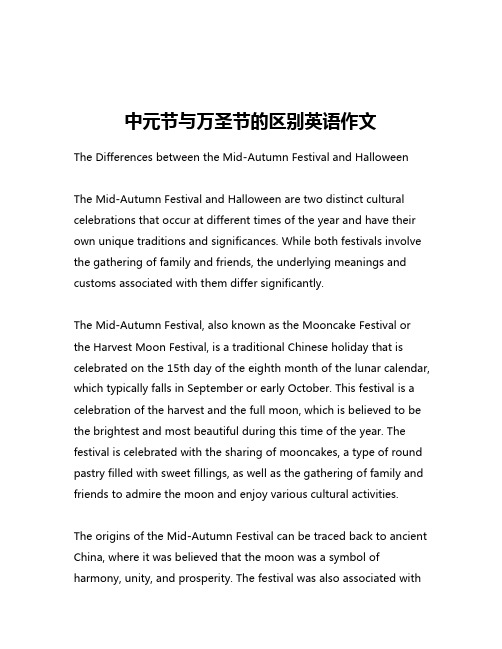
中元节与万圣节的区别英语作文The Differences between the Mid-Autumn Festival and HalloweenThe Mid-Autumn Festival and Halloween are two distinct cultural celebrations that occur at different times of the year and have their own unique traditions and significances. While both festivals involve the gathering of family and friends, the underlying meanings and customs associated with them differ significantly.The Mid-Autumn Festival, also known as the Mooncake Festival or the Harvest Moon Festival, is a traditional Chinese holiday that is celebrated on the 15th day of the eighth month of the lunar calendar, which typically falls in September or early October. This festival is a celebration of the harvest and the full moon, which is believed to be the brightest and most beautiful during this time of the year. The festival is celebrated with the sharing of mooncakes, a type of round pastry filled with sweet fillings, as well as the gathering of family and friends to admire the moon and enjoy various cultural activities.The origins of the Mid-Autumn Festival can be traced back to ancient China, where it was believed that the moon was a symbol of harmony, unity, and prosperity. The festival was also associated withthe worship of the moon goddess, Chang'e, who was said to have lived on the moon. The tradition of sharing mooncakes during the festival is believed to have originated from the legend of the moon goddess and her husband, the archer Hou Yi, who was said to have shot down nine of the ten suns in the sky to save the people from the scorching heat.In contrast, Halloween is a Western holiday that is celebrated on the 31st of October, primarily in the United States, Canada, and other parts of the world. The origins of Halloween can be traced back to the ancient Celtic festival of Samhain, which was a celebration of the end of the harvest season and the beginning of the new year. During this time, it was believed that the boundary between the world of the living and the world of the dead became blurred, and spirits were able to walk the earth.The modern celebration of Halloween involves the dressing up of children and adults in costumes, often representing supernatural beings such as ghosts, goblins, and witches, and the trick-or-treating tradition, where children go door-to-door in their neighborhoods, asking for candy or other treats. Additionally, Halloween is associated with the carving of pumpkins into jack-o'-lanterns, the telling of spooky stories, and the decoration of homes and public spaces with Halloween-themed decorations.While both the Mid-Autumn Festival and Halloween involve the gathering of family and friends, the underlying meanings and customs associated with each festival are quite different. The Mid-Autumn Festival is a celebration of the harvest, the moon, and the unity of family, while Halloween is a celebration of the supernatural and the blurring of the boundary between the living and the dead.Another key difference between the two festivals is the level of religious or spiritual significance. The Mid-Autumn Festival has strong roots in traditional Chinese beliefs and practices, with the moon goddess Chang'e and the legend of Hou Yi playing a central role in the festival's symbolism and rituals. In contrast, while Halloween has its origins in the ancient Celtic festival of Samhain, which had a strong spiritual and religious component, the modern celebration of Halloween in many parts of the world has become more of a secular, commercial, and family-oriented event, with less emphasis on the supernatural or spiritual aspects.Moreover, the visual and aesthetic elements of the two festivals also differ significantly. The Mid-Autumn Festival is often associated with the vibrant colors of red and gold, which are considered auspicious in Chinese culture, as well as the round shape of the mooncakes and the full moon itself. In contrast, Halloween is typically associated with darker, more spooky imagery, such as black cats, bats, and jack-o'-lanterns, as well as the use of orange and black as the predominantcolor scheme.In conclusion, while the Mid-Autumn Festival and Halloween share some similarities in terms of being celebrations that involve the gathering of family and friends, the underlying meanings, customs, and cultural significance of these two festivals are quite distinct. The Mid-Autumn Festival is a celebration of the harvest, the moon, and the unity of family, while Halloween is a celebration of the supernatural and the blurring of the boundary between the living and the dead. Understanding the differences between these two festivals can help to appreciate the rich cultural diversity and traditions that exist around the world.。
万圣节的来历和习俗介绍
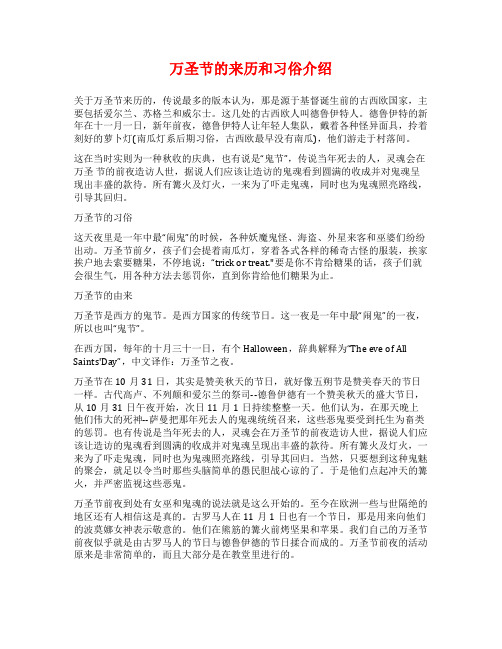
万圣节的来历和习俗介绍关于万圣节来历的,传说最多的版本认为,那是源于基督诞生前的古西欧国家,主要包括爱尔兰、苏格兰和威尔士。
这几处的古西欧人叫德鲁伊特人。
德鲁伊特的新年在十一月一日,新年前夜,德鲁伊特人让年轻人集队,戴着各种怪异面具,拎着刻好的萝卜灯(南瓜灯系后期习俗,古西欧最早没有南瓜),他们游走于村落间。
这在当时实则为一种秋收的庆典,也有说是“鬼节”,传说当年死去的人,灵魂会在万圣节的前夜造访人世,据说人们应该让造访的鬼魂看到圆满的收成并对鬼魂呈现出丰盛的款待。
所有篝火及灯火,一来为了吓走鬼魂,同时也为鬼魂照亮路线,引导其回归。
万圣节的习俗这天夜里是一年中最“闹鬼”的时候,各种妖魔鬼怪、海盗、外星来客和巫婆们纷纷出动。
万圣节前夕,孩子们会提着南瓜灯,穿着各式各样的稀奇古怪的服装,挨家挨户地去索要糖果,不停地说:“trick or treat."要是你不肯给糖果的话,孩子们就会很生气,用各种方法去惩罚你,直到你肯给他们糖果为止。
万圣节的由来万圣节是西方的鬼节。
是西方国家的传统节日。
这一夜是一年中最“闹鬼”的一夜,所以也叫“鬼节”。
在西方国,每年的十月三十一日,有个Halloween,辞典解释为“The eve of All Saints'Day”,中文译作:万圣节之夜。
万圣节在10月31日,其实是赞美秋天的节日,就好像五朔节是赞美春天的节日一样。
古代高卢、不列颠和爱尔兰的祭司--德鲁伊德有一个赞美秋天的盛大节日,从10月31日午夜开始,次日11月1日持续整整一天。
他们认为,在那天晚上他们伟大的死神--萨曼把那年死去人的鬼魂统统召来,这些恶鬼要受到托生为畜类的惩罚。
也有传说是当年死去的人,灵魂会在万圣节的前夜造访人世,据说人们应该让造访的鬼魂看到圆满的收成并对鬼魂呈现出丰盛的款待。
所有篝火及灯火,一来为了吓走鬼魂,同时也为鬼魂照亮路线,引导其回归。
当然,只要想到这种鬼魅的聚会,就足以令当时那些头脑简单的愚民胆战心谅的了。
Halloween_Traditions_Around_the_World_世界各地的鬼节传统
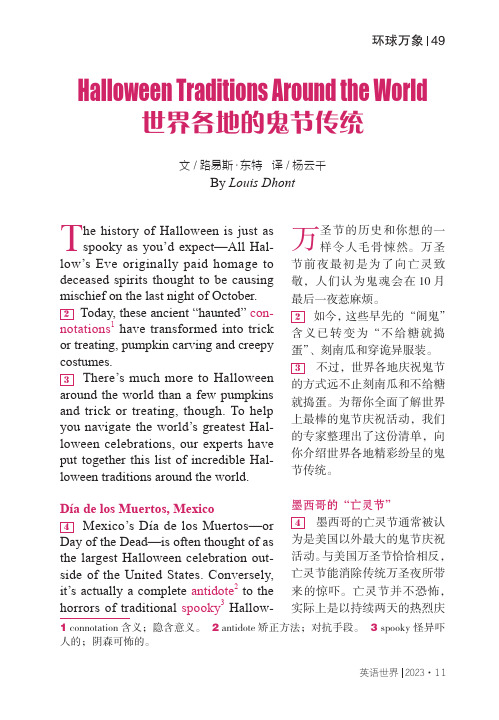
中国的“中元节”
5 中元节在农历七月十五日举行,是中国纪念逝者的独特节日。
当地人相信农历七月(通常对应公历八月或九月)是亡灵不得安宁、出来活动的时候。
为了安抚这些鬼魂,也是为了告慰自己的祖先,人们会在家里及街边摆放食物作为供品。
6 为了尽可能让这些亡灵有事可做,在这吉祥日子里会举行一系列演出,包括讲述神话故事的中国戏曲。
中元节的起源与万圣节类似,但也为游客提供了一个绝佳机会来了解古代中国的祖先崇拜习俗。
祖墓,表达对已逝亲人的感激和尊敬。
随后为营造轻松氛围,韩国人会参与各种传统民间游戏和舞蹈,最后以享用地方美食来结束庆祝活动。
尽管不同于传统意义上的鬼节,秋夕对逝者的纪念仍为庆祝活动增添了一丝神秘氛围。
意大利的“诸灵节”
11 在欧洲各国,11月2日的诸灵节是欧洲人纪念已故亲人的日子。
节日活动始于一场庄重的弥撒,人们为逝者祈祷并奉上祭品,随后各家族前往祖墓祭拜。
万圣节的由来_万圣节的来历

万圣节的由来_万圣节的来历万圣节的由来,万圣节的来历万圣节英语是AllSaintsDay,亦称“诸圣瞻礼”,天主教和东正教节日之一,是西方国家的传统节日。
华语地区常将万圣夜误称为万圣节。
“Hallow”来源于中古英语halwen,与holy词源很接近,在苏格兰和加拿大的某些区域,万圣节仍然被称为“AllHallowMas”。
那一天,要举行的弥撒仪式Mass是庆祝在天的全体圣人Hallow。
现在社会上为了商业利益或其他目的,在10月31日夜里组织各种充满妖魔鬼怪的活动,完全背离了万圣节的神圣意义。
关于万圣节由来的,版本繁多,流传较广的是:两千多年前,欧洲的基督教会把11月1日定为“天下圣徒之日”AllHallows'Day。
“Hallow”即圣徒之意。
传说自公元前五百年,居住在爱尔兰、苏格兰等地的凯尔特人Celts把这节日往前移了一天,即10月31日。
他们认为该日是夏天正式结束的日子,也就是新年伊始,严酷的冬天开始的一天。
那时人们相信,故人的亡魂会在这一天回到故居地在活人身上找寻生灵,借此再生,而且这是人在死后能获得再生的唯一希望。
而活人则惧怕死人的魂灵来夺生,于是人们就在这一天熄掉炉火、烛光,让死人的魂灵无法找到活人,又把自己打扮成妖魔鬼怪把死人的魂灵吓走。
之后,他们又会把火种、烛光重新燃起,开始新的一年的生活。
万圣节原本其实是赞美秋天的节日,就好像五月节是赞美春天一样。
古代高卢、不列颠和爱尔兰的祭司——德鲁伊德有一个赞美秋天的盛大节日,从10月31日的午夜到次日11月1日,持续整整一天。
他们认为,在那天晚上他们伟大的死神——萨曼把那年死去人的鬼魂统统召来,这些恶鬼要受到托生为畜类的惩罚。
当然,只要想到这种鬼魅的聚会,就足以令当时那些头脑简单的愚民胆战心惊了。
于是他们点起冲天的篝火,并严密监视这些恶鬼。
万圣节前夜到处有女巫和鬼魂的说法就是这么开始的。
至今在欧洲某些与世隔绝的地区,还有人相信这是真的。
万圣节vs中国鬼节

some words and praises
万圣节: Halloween 妖精(yāgoojbinlign): 骨头(gǔbtoonue):s 南瓜: Pumpkin 猫头鹰: owl 蜡烛: candle 狼人: werewolf 魔鬼: demon 糖果: candy 巫婆: witch
蝙蝠(biābnatfú):
most active at night and can take many forms including: snakes, moths (蛾) , birds, foxes, wolves, and tigers.
They can even appear as beautiful men or women to
seduce(引诱(yǐntyhòeul)i)ving. When they possess an
individual by entering the body they cause illness and
mental disorders.
第十二页,共21页。
Hungry Ghost Festival
revenge upon those who wronged them in life. This
month-long festival is known as the Hungry Ghost
Festival and takes place during the 7th lunar month.
第十页,共21页。
seen. This is done to redeem the soul of those who died by drowning.
第十三页,共21页。
Hungry Ghost Festival
万圣节与传统中国鬼节的异同
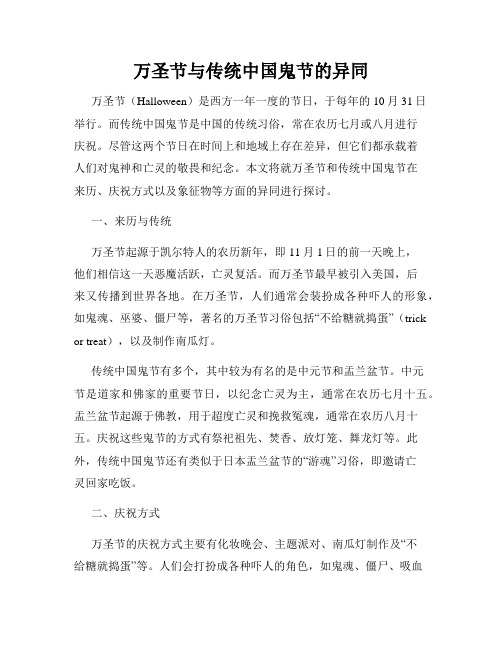
万圣节与传统中国鬼节的异同万圣节(Halloween)是西方一年一度的节日,于每年的10月31日举行。
而传统中国鬼节是中国的传统习俗,常在农历七月或八月进行庆祝。
尽管这两个节日在时间上和地域上存在差异,但它们都承载着人们对鬼神和亡灵的敬畏和纪念。
本文将就万圣节和传统中国鬼节在来历、庆祝方式以及象征物等方面的异同进行探讨。
一、来历与传统万圣节起源于凯尔特人的农历新年,即11月1日的前一天晚上,他们相信这一天恶魔活跃,亡灵复活。
而万圣节最早被引入美国,后来又传播到世界各地。
在万圣节,人们通常会装扮成各种吓人的形象,如鬼魂、巫婆、僵尸等,著名的万圣节习俗包括“不给糖就捣蛋”(trick or treat),以及制作南瓜灯。
传统中国鬼节有多个,其中较为有名的是中元节和盂兰盆节。
中元节是道家和佛家的重要节日,以纪念亡灵为主,通常在农历七月十五。
盂兰盆节起源于佛教,用于超度亡灵和挽救冤魂,通常在农历八月十五。
庆祝这些鬼节的方式有祭祀祖先、焚香、放灯笼、舞龙灯等。
此外,传统中国鬼节还有类似于日本盂兰盆节的“游魂”习俗,即邀请亡灵回家吃饭。
二、庆祝方式万圣节的庆祝方式主要有化妆晚会、主题派对、南瓜灯制作及“不给糖就捣蛋”等。
人们会打扮成各种吓人的角色,如鬼魂、僵尸、吸血鬼等,参加派对活动并进行化妆比赛。
此外,万圣节期间,人们还会在自家门前放置南瓜灯,以营造节日氛围。
而在“不给糖就捣蛋”活动中,孩子们会穿上各种服装,挨家挨户讨要糖果。
传统中国鬼节的庆祝方式则包括祭祀祖先、焚香、放灯笼和游魂等习俗。
人们会在墓地或家中祭祀祖先,烧纸钱、烛灯和香,以表达对逝去亲人的敬意。
为了驱赶恶灵和吸引好运,人们还会放飞纸灯笼和燃放烟花爆竹。
游魂习俗是邀请亡灵回家吃饭,人们会在餐桌上摆放一席美食,以招待逝去的亲人。
三、象征物和意义万圣节的象征物主要有南瓜、鬼脸和巫婆帽子等。
南瓜是万圣节最具代表性的象征物,人们会将南瓜挖空并雕刻成各种面孔,制作成南瓜灯。
万圣夜是啥意思
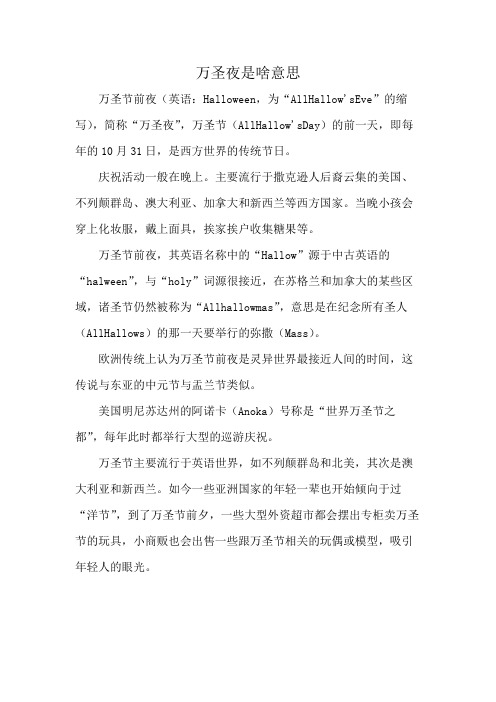
万圣夜是啥意思
万圣节前夜(英语:Halloween,为“AllHallow'sEve”的缩写),简称“万圣夜”,万圣节(AllHallow'sDay)的前一天,即每年的10月31日,是西方世界的传统节日。
庆祝活动一般在晚上。
主要流行于撒克逊人后裔云集的美国、不列颠群岛、澳大利亚、加拿大和新西兰等西方国家。
当晚小孩会穿上化妆服,戴上面具,挨家挨户收集糖果等。
万圣节前夜,其英语名称中的“Hallow”源于中古英语的“halween”,与“holy”词源很接近,在苏格兰和加拿大的某些区域,诸圣节仍然被称为“Allhallowmas”,意思是在纪念所有圣人(AllHallows)的那一天要举行的弥撒(Mass)。
欧洲传统上认为万圣节前夜是灵异世界最接近人间的时间,这传说与东亚的中元节与盂兰节类似。
美国明尼苏达州的阿诺卡(Anoka)号称是“世界万圣节之都”,每年此时都举行大型的巡游庆祝。
万圣节主要流行于英语世界,如不列颠群岛和北美,其次是澳大利亚和新西兰。
如今一些亚洲国家的年轻一辈也开始倾向于过“洋节”,到了万圣节前夕,一些大型外资超市都会摆出专柜卖万圣节的玩具,小商贩也会出售一些跟万圣节相关的玩偶或模型,吸引年轻人的眼光。
什么叫做万圣节
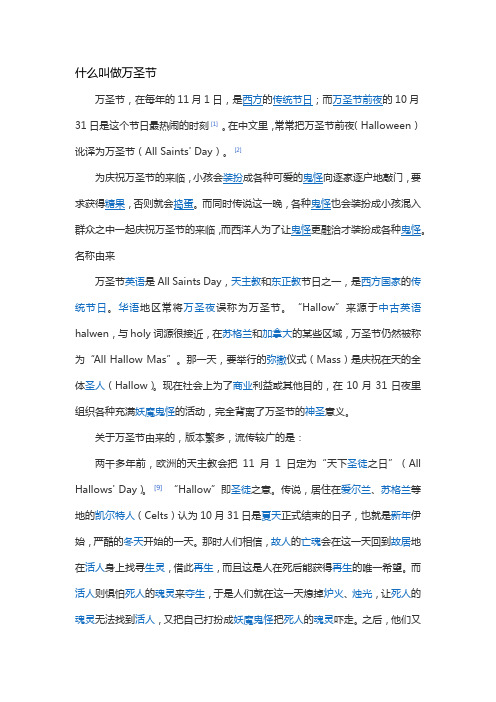
什么叫做万圣节31日是这个节日最热闹的时刻 [1]。
在中文里,常常把万圣节前夜(Halloween)讹译为万圣节(All Saints' Day)。
[2]为庆祝万圣节的来临,小孩会装扮成各种可爱的鬼怪向逐家逐户地敲门,要求获得糖果,否则就会捣蛋。
而同时传说这一晚,各种鬼怪也会装扮成小孩混入群众之中一起庆祝万圣节的来临,而西洋人为了让鬼怪更融洽才装扮成各种鬼怪。
名称由来万圣节英语是All Saints Day,天主教和东正教节日之一,是西方国家的传统节日。
华语地区常将万圣夜误称为万圣节。
“Hallow”来源于中古英语halwen,与holy词源很接近,在苏格兰和加拿大的某些区域,万圣节仍然被称为“All Hallow Mas”。
那一天,要举行的弥撒仪式(Mass)是庆祝在天的全体圣人(Hallow)。
现在社会上为了商业利益或其他目的,在10月31日夜里组织各种充满妖魔鬼怪的活动,完全背离了万圣节的神圣意义。
关于万圣节由来的,版本繁多,流传较广的是:两千多年前,欧洲的天主教会把11月1日定为“天下圣徒之日”(All Hallows' Day)。
[9]“Hallow”即圣徒之意。
传说,居住在爱尔兰、苏格兰等地的凯尔特人(Celts)认为10月31日是夏天正式结束的日子,也就是新年伊始,严酷的冬天开始的一天。
那时人们相信,故人的亡魂会在这一天回到故居地在活人身上找寻生灵,借此再生,而且这是人在死后能获得再生的唯一希望。
而活人则惧怕死人的魂灵来夺生,于是人们就在这一天熄掉炉火、烛光,让死人的魂灵无法找到活人,又把自己打扮成妖魔鬼怪把死人的魂灵吓走。
之后,他们又会把火种、烛光重新燃起,开始新的一年的生活。
万圣节原本其实是赞美秋天的节日,就好像五月节是赞美春天一样。
古代高卢、不列颠和爱尔兰的祭司——德鲁伊德有一个赞美秋天的盛大节日,从10月31日的午夜到次日11月1日,持续整整一天。
他们认为,在那天晚上他们伟大的死神——萨曼把那年死去人的鬼魂统统召来,这些恶鬼要受到托生为畜类的惩罚。
外研版一起5年级上册英语Module 3

பைடு நூலகம்
05 Match answers with pictures.
名称由来
万圣节英语是All Saints Day,亦称“诸圣瞻礼”,天主 教和东正教节日之一,是西方国家的传统节日。华语地 区常将万圣夜误称为万圣节。“Hallow”来源于中古英 语halwen,与holy词源很接近,在苏格兰和加拿大的某 些区域,万圣节仍然被称为“All Hallow Mas”。
拍膜拜恐惧与死亡。
南瓜灯的由来
中元节
VS
万圣节
中国传统的七月中元节与西方的万圣节相仿,在鬼节这段时间里连许多匪徒都忌讳许 多事情,就是为了避免遇到晦气。可见即使在民间信仰中都知道,精灵鬼怪之事最好 敬而远之。可惜的是却把它包装成一个狂欢、刺激、放任的节日,在商业利益诱因的 推波助澜之下,把万圣节哄抬成除了圣诞节与感恩节之外的第三大节期,每年此时在
Dragon Boat Festival lunar May 5th zongzi
Jack-o-lanterns pumpkin lanterns
Today is Halloween.
Module 3 Unit 1
目录/CONTENTS
01 万圣节的起源
The origin of Halloween
也有家长把孩子打扮成他们喜欢的卡通形象的。
南瓜灯的由来
南瓜灯源于古代爱尔兰。传说一个名叫Jack的人,是个醉汉且爱恶作剧。在万圣节 当日,他设圈套将魔鬼困在一棵树上,他不许魔鬼下来,直至恶魔答应永远不让他 住在地狱。Jack死后,因他不相信神,他不能进天堂,而魔鬼也不让他入地狱,为 了协助Jack找到回人间的路径,魔鬼给了他一块燃烧的炭,Jack将这燃烧的炭放在 他以大红萝卜雕刻成的一个灯笼内,这第一个“Jack的灯笼”,帮助积找寻他的路
- 1、下载文档前请自行甄别文档内容的完整性,平台不提供额外的编辑、内容补充、找答案等附加服务。
- 2、"仅部分预览"的文档,不可在线预览部分如存在完整性等问题,可反馈申请退款(可完整预览的文档不适用该条件!)。
- 3、如文档侵犯您的权益,请联系客服反馈,我们会尽快为您处理(人工客服工作时间:9:00-18:30)。
lights is always give people hope and courage. ``````
damage,in July 15 is ‘middle Purdue’offered unclaimed soul.(无主孤魂)
The Origin Of Halloween
As the Ghost Festival,the origin of Halloween also complicated(复杂的) and confusing,saying many.
琼州 渔民
台北基隆
台北基隆
The Custom Of Halloween
Said to Halloween,people will naturally think of pumpkin lamp(南瓜灯),odd loading strange clothing(奇装异服) and ‘strick or treat’game.In fact,most western countries are not on Halloween holiday,so Halloween activity mainly in the evening.There are also some school will hold a Halloween costume party.Night falls,the children put on colorful cosmetic suit,carrying a lamp,go to ring the neighbor’s door,yelling ‘trick or treat’.This picture is so warm.
中西文化
Now,the Chinese and Western cultures in kept melting.We increasing played a Westerned holiday.However,we still hope,in the acceptance of western culture and Chinese culture,don’t forget.Like the ghost festival and Halloween,although at different times,different origins,but they like the wonderful,as we celebrate.
Halloween&Ghost festival
Differences Similarities
➢Origin(起源) ➢Custom(习俗)
The Origin Of Ghost Festival
For the Ghost Festival every year lunar calendar in July 15(农历7月15),its origins,there are a lot of stories,the most inportant is the Buddha(佛说) and tao say(道说).
The Custom Of Ghost Festival
There are many ghost festival customs.People burn paper money(纸 钱),people chanting(念经) for the dead spirits,but most notably Fang He Deng,also called lotus lamps(荷花灯),lanterns on rivers and lakes,let it drift.And the legendary (传说),Deng can lead revenants(亡 魂),Purdue(普度) water ghosts and other wild ghost.
In the ghost festival night,in many places the river, a lamp lit lanterns,free floating,carrying people to the blessing(祝愿) and mercy(怜 悯),float to the kingdom of heaven.
Buddhist scriptures ‘tripitaka’(大藏经) recorded in the eyes lotus(目莲) in Buddha’s help to save the
mother’s story,in order to commemorate the eyes lotus,praised him for his filial piety(孝道).Buddhism will in July 15 as the Bon(盂兰盆节 )Festival and the
Every November is the western traditional Halloween.Legend November 1st is ancient Europe’s New Year’s Day,people believe that in the New Year’s Eve,when the dead will visit Earth,so people let young people dress in to avoid disaster reduction difficult.then, this day will become a Halloween.
